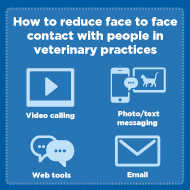
Social distancing for veterinary teams
Current government advice states that veterinary practices must reduce face to face contact immediately, in order to reduce transmission of COVID-19. This article covers several methods of introducing social distancing measures in practice, whilst continuing to provide veterinary care.
Alternative communication methods
Use of technology, such as video or telephone calls, can be used to carry out certain consultations remotely. This also offers an alternative mode of working from home for veterinary surgeons.
Additionally, web tools – such as online chat support – emails and text messages can be used to maintain effective communication. Clients can be asked to send photos of their pets using these platforms, to aid in examinations and triage.
Limiting footfall in practice
If a client needs to visit the practice, social distancing can be maintained by requesting that only one person accompanies an animal per appointment, as well as by asking clients to wait in their cars, allowing staff to bring animals into the building for examination.
Clients can also be asked to wait in the carpark to collect prescriptions. Or these could be posted to the client's home.
If you have any suggestions on how to further reduce face to face contact in veterinary practices, please email editor@mrcvs.co.uk



 RCVS Knowledge has welcomed Professor Peter Cockcroft as editor-in-chief for Veterinary Evidence.
RCVS Knowledge has welcomed Professor Peter Cockcroft as editor-in-chief for Veterinary Evidence.